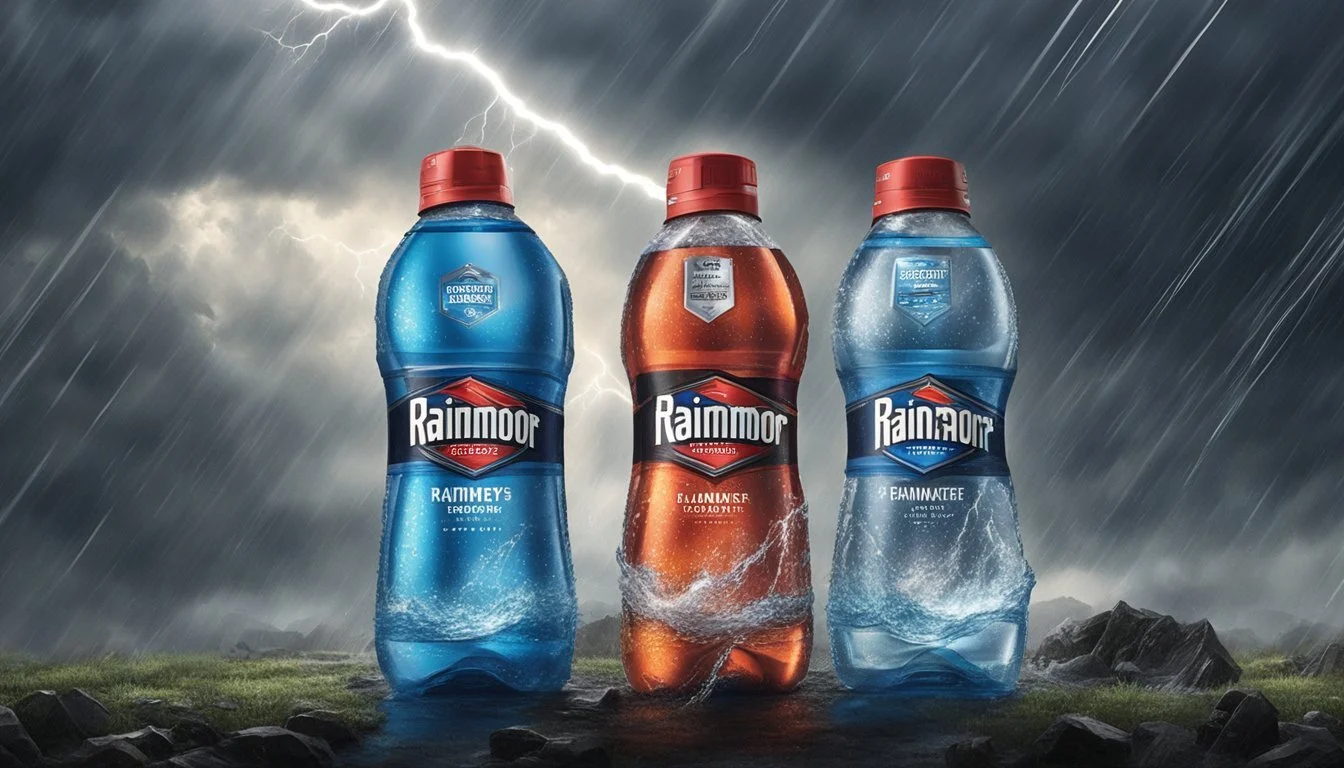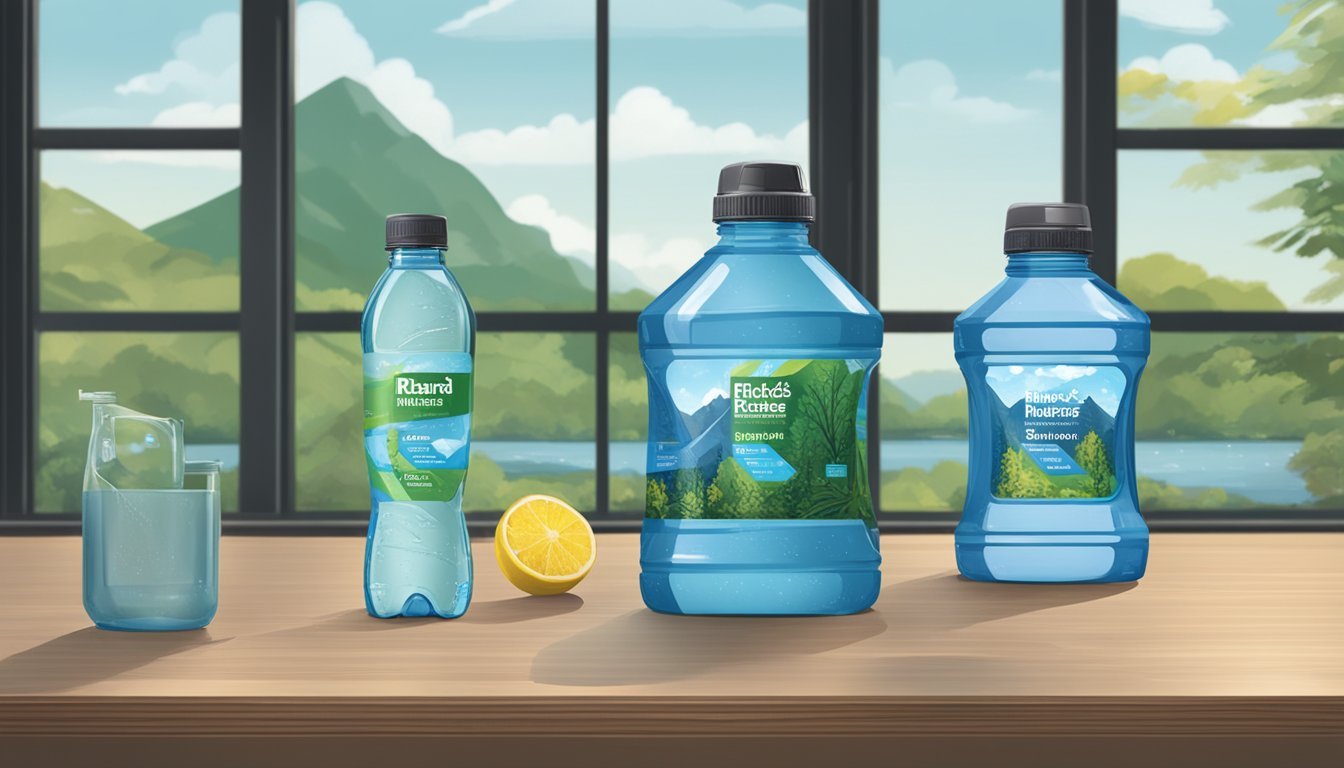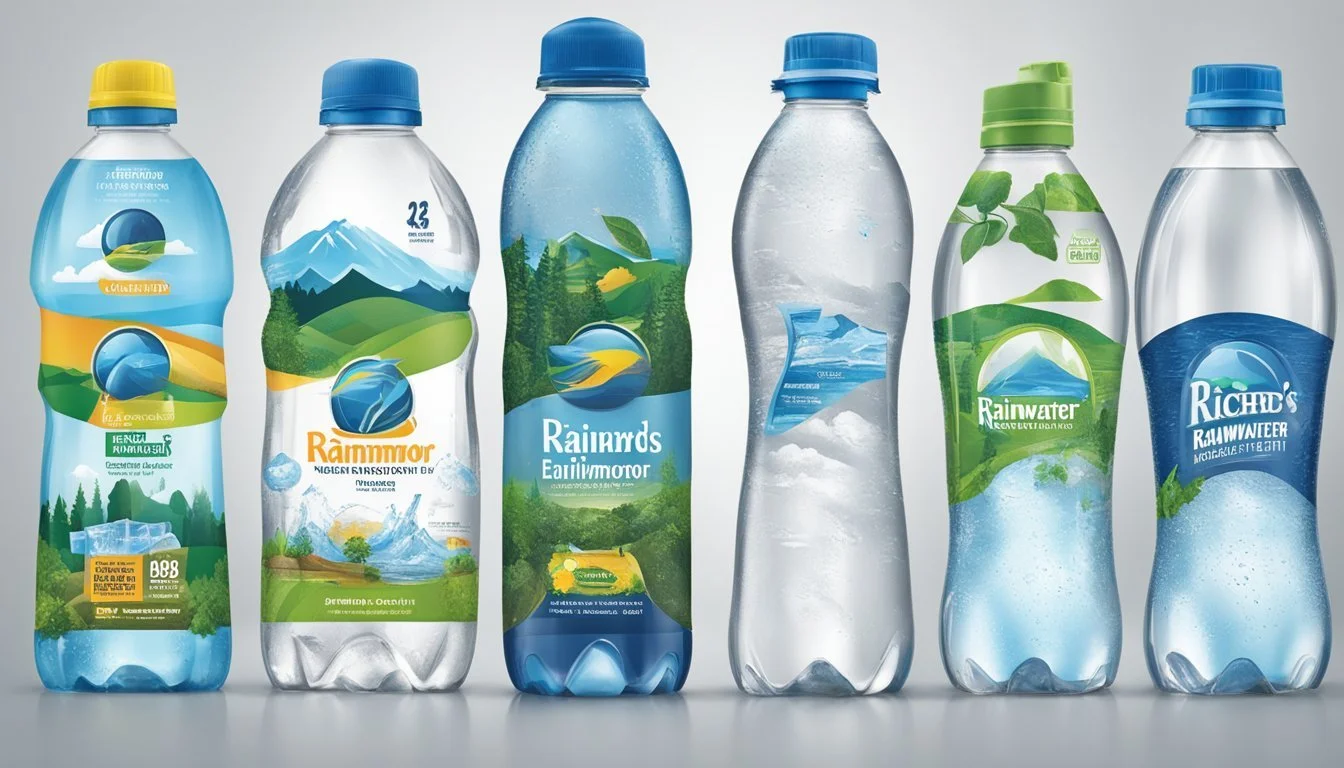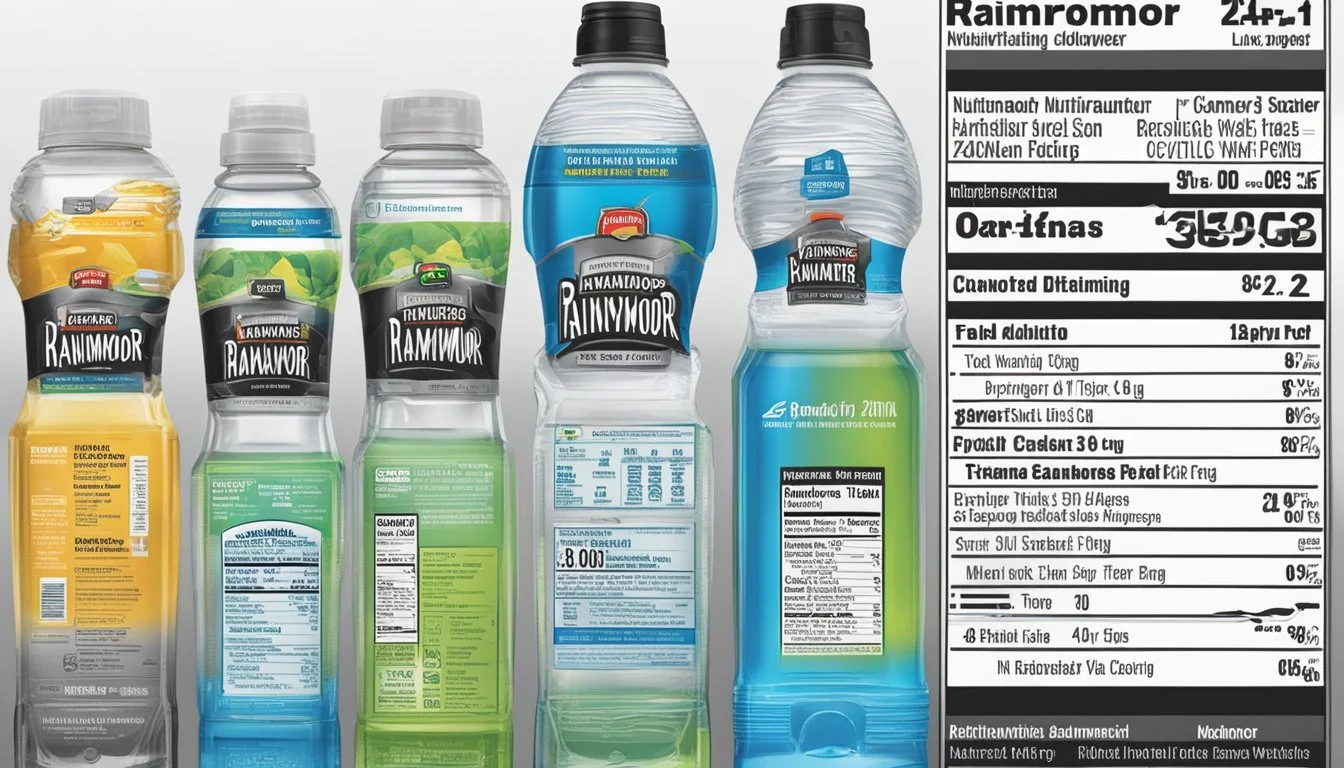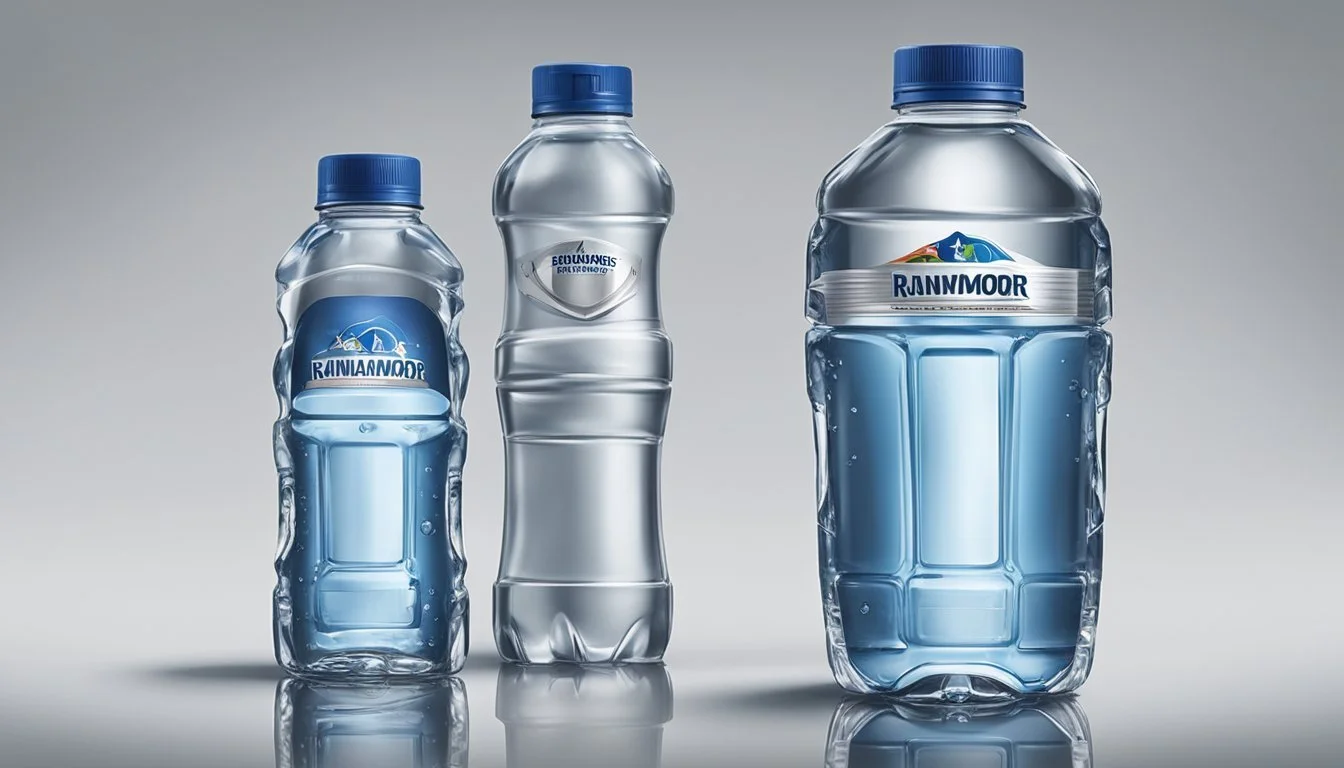Richard’s Rainwater vs. BodyArmor
Comparing Bottled Water Quality
Choosing between Richard’s Rainwater and BodyArmor can be a challenge for anyone seeking high-quality hydration. Richard’s Rainwater offers a unique proposition by capturing rainwater in its purest form, ensuring a sustainable and eco-friendly hydration source. This process not only helps prevent storm runoff but also provides water that is free from ground contaminants, making it a compelling choice for the environmentally conscious consumer.
BodyArmor, on the other hand, is known for its electrolyte-enhanced sports drinks designed for athletes and active individuals. While BodyArmor’s formula is specially crafted to replenish electrolytes and provide quick hydration, it also includes added sugars and flavors that might not appeal to everyone looking for a clean, natural water source.
Ultimately, the choice between Richard’s Rainwater and BodyArmor depends on your specific needs and preferences. If you prioritize sustainability and purity, Richard’s Rainwater stands out. If electrolyte replenishment and sports performance are your main concerns, BodyArmor may be the better option.
Understanding Bottled Water
Bottled water has diverse origins with a rich history and various types catering to different tastes and needs.
Historical Context of Bottled Water
The concept of bottled water dates back to 1622 when it was first sold in the United Kingdom. Early bottled water was sought for its supposed therapeutic benefits and was often sourced from natural springs.
In the 1970s, bottled water became more widespread due to increased concerns over tap water quality. The convenience and perceived purity drove its popularity, leading to today's vast market of bottled water options.
Types of Bottled Water
Spring Water
Collected from natural springs and typically less processed, maintaining its mineral content. Consumers value its taste and natural filtering process through underground rocks.
Purified Water
Undergoes various purification processes like reverse osmosis, distillation, or deionization. Lacks minerals found in spring water but is often chosen for its consistency and purity.
Mineral Water
Naturally contains dissolved minerals. It must have at least 250 parts per million total dissolved solids. Highly valued for its unique taste and health benefits.
Rainwater
Captured directly from the atmosphere before making contact with the ground. Companies like Richard's Rainwater capture this to provide a pure, renewable source without the need for extensive treatment, making it 100% potable.
The Emergence of Richard’s Rainwater
Richard’s Rainwater started as a quest to find pure and delicious water that could also contribute positively to the environment. This initiative combines innovative rainwater collection and filtration techniques with an overarching commitment to sustainability.
Origin Story of Richard Heinichen
Richard Heinichen, the founder of Richard’s Rainwater, began this journey with the intention of providing cleaner water for his family. Dissatisfied with traditional bottled water options, he turned to rainwater, which he believed to be the purest natural source.
Heinichen's small-scale venture soon expanded as he recognized the potential for a larger impact. His determination to offer an alternative to conventional water sources led to the creation of the first nationally distributed bottled rainwater.
Rainwater Collection and Filtration
Richard’s Rainwater employs a unique method to harvest and purify rainwater. The process begins with the collection of raindrops directly from the sky, ensuring that the water remains uncontaminated by ground pollutants.
Once collected, the rainwater undergoes rigorous filtration in a closed-loop system that minimizes water loss. This system ensures that nearly all water collected is purified and bottled, resulting in an exceptionally clean and smooth taste.
Sustainability Efforts
One of the core principles behind Richard’s Rainwater is sustainability. The company uses a renewable resource — rainwater — and emphasizes minimal environmental impact. Their commitment to sustainability is evident in their nearly zero-loss filtration process.
By utilizing infinitely recyclable bottles, they reduce waste and promote environmental responsibility. Additionally, Richard’s Rainwater works with regulators to ensure that their collection practices are environmentally sound.
Richard’s Rainwater’s approach demonstrates how innovative methods can offer both high-quality products and environmental benefits.
Exploring BodyArmor
BodyArmor is positioned as a premium beverage brand, focusing on hydration and athletic performance. It distinguishes itself through its unique product offerings and strategic marketing efforts.
Brand Overview
BodyArmor was launched with the objective of providing superior hydration drinks tailored for athletes. The brand emphasizes its use of natural ingredients, including electrolytes, potassium-packed coconut water, and essential vitamins. These elements aim to improve hydration efficiency and muscle recovery.
Moreover, BodyArmor products are typically free from artificial colors and sweeteners, positioning it as a healthier alternative to traditional sports drinks. Formulated for both professional athletes and fitness enthusiasts, BodyArmor has garnered a loyal following.
Product Range
The BodyArmor product lineup is diverse and designed to meet various hydration needs. Key products include:
BodyArmor Sports Drink: Offers a combination of electrolytes, vitamins, and coconut water.
BodyArmor LYTE: A lower-calorie version with natural sweeteners.
BodyArmor Water: pH-balanced with added electrolytes.
BodyArmor EDGE: Contains caffeine for an energy boost alongside hydration.
Each product targets different consumer preferences and occasions, from post-workout recovery to daily hydration. The brand's ability to cater to distinct needs helps it maintain a competitive edge in the crowded beverage market.
Marketing and Branding Strategies
BodyArmor's marketing strategy leverages endorsements from high-profile athletes, including Kobe Bryant and Mike Trout, enhancing its credibility in the sports community. The brand focuses on digital campaigns and social media engagement to reach a younger, active audience.
Additionally, BodyArmor employs bold, vibrant packaging that stands out on store shelves and reinforces its energetic brand persona. It also emphasizes its commitment to healthier living, frequently highlighting the absence of artificial additives in its products.
Collaborations with fitness events and partnerships with sports teams further elevate BodyArmor's appeal, solidifying its reputation as a premium hydration solution for both amateur and professional athletes.
Comparative Analysis: Quality and Taste
Both Richard’s Rainwater and BodyArmor aim to provide high-quality bottled water. Key factors in comparing them include the purity achieved through their filtration processes and their distinctive taste profiles.
Water Purity and Filtration Processes
Richard’s Rainwater employs a unique approach by capturing rainwater before it touches the ground. This reduces contamination risks. Their multi-step filtration includes a carbon filter, UV light, and ozone treatment. The result is remarkably pure water, free of impurities and harmful chemicals.
BodyArmor sources its water from natural springs. Its purification process involves microfiltration, reverse osmosis, and UV light. This ensures high purity while retaining beneficial minerals. The natural spring source enhances its mineral profile, contributing to its pure and clean taste.
Taste Profile Comparisons
Richard’s Rainwater offers a refreshing, clean taste. The rainwater source gives it a soft, neutral flavor, free from any strong mineral aftertaste. This makes it versatile and appealing for those who prefer a subtle taste.
BodyArmor has a crisp and slightly mineral-rich flavor due to its natural spring source. The presence of electrolytes like potassium and magnesium enhances hydration, especially for athletes. Its taste is clean, with a mildly invigorating essence, appealing to users who enjoy a more pronounced mineral flavor in their water.
Health and Safety Considerations
Both Richard’s Rainwater and BodyArmor cater to providing safe drinking water, but their methods vary in handling chlorine and fluoride.
Effects of Chlorine and Fluoride
Richard's Rainwater
Richard's Rainwater captures rain before it touches the ground, bypassing exposure to contaminants like chlorine and fluoride. This method ensures the water is pure and free from additives, making it ideal for those seeking a natural, untouched hydration source.
BodyArmor
BodyArmor targets active lifestyles and often includes additional electrolytes. However, unlike Richard's Rainwater, the presence of chlorine and fluoride can vary depending on the source. While these elements help in disinfection and dental health, some consumers prefer minimizing their intake for various health reasons.
Safe Drinking Water
Safe drinking water is a top priority for both brands. Richard's Rainwater's method allows for a naturally purified product free from common urban pollutants. BodyArmor, though augmented for hydration and performance, relies on the source and potential treatment processes that could involve chlorine and fluoride.
Sustainable Practices
Richard's Rainwater emphasizes sustainability by using natural rainwater, reducing dependency on traditional water supplies. BodyArmor also advocates for environmental-conscious packaging, but the treatment processes may still involve conventional methods that include chlorine and fluoride, aligning with their functional benefits.
Environmental Impact and Sustainability
Richard's Rainwater and BodyArmor both take unique approaches to minimizing their environmental footprint, focusing on sustainability goals through innovative practices and packaging solutions.
Packaging Choices and Waste Reduction
Richard's Rainwater utilizes recyclable aluminum cans and glass bottles, aiming for minimal waste by avoiding plastic. These packaging choices are more sustainable as they are easier to recycle and have higher reuse potential.
On the other hand, BodyArmor often uses plastic PET bottles, which are widely recyclable but can contribute to environmental waste if not properly managed. Their commitment to using 100% recycled plastic for some product lines demonstrates an effort to reduce waste.
Both companies emphasize the importance of reducing packaging waste but utilize different materials to do so.
Carbon Footprint and Renewable Practices
Richard's Rainwater captures and bottles rainwater, reducing the carbon footprint associated with water extraction and extensive filtration processes. This method harnesses a natural resource and minimizes energy use, aligning with renewable practices.
BodyArmor works on improving its carbon footprint by optimizing transportation logistics and investing in renewable energy sources for production. Though their sourcing process is more traditional, efforts to offset emissions and integrate sustainable energy show their dedication to reducing their carbon footprint.
Carbon offset programs and investment in renewable energies illustrate both companies' commitment to lowering their environmental impact.
Access to Clean Water in Urban Areas
Richard's Rainwater ensures high access to clean water by capturing rain, considered among the purest forms of water, directly from the source before it contacts the ground. They emphasize offering clean, naturally filtered water especially in urban areas where water quality may vary.
BodyArmor, with a broader distribution network, provides wide availability in urban centers. Their focus on enhanced hydration and product accessibility ensures that consumers in cities have ready access to quality bottled water.
Both brands recognize the importance of urban water accessibility, though their approaches and target markets may vary.
Distribution and Accessibility
Richard's Rainwater and BodyArmor have differing approaches to distribution and accessibility, focusing on strategic retail partnerships and global reach.
Retail Presence and Partnerships
Richard's Rainwater is available at select premium retailers such as Whole Foods, emphasizing its eco-friendly and premium positioning. They also utilize local partnerships to ensure their unique product reaches environmentally conscious consumers.
BodyArmor, on the other hand, has a broader retail presence, including major supermarket chains like Kroger. Their extensive network enables them to target a wide range of consumers, from athletes to everyday hydration seekers.
In comparison, while Richard's Rainwater focuses on niche markets, BodyArmor leverages widespread availability through diverse retail partnerships to enhance their market reach.
Global Distribution Strategies
Richard's Rainwater focuses on regional production to minimize transport and environmental impact. Their rainwater collection and bottling sites in the U.S. allow them to serve local markets effectively while maintaining sustainability credentials.
BodyArmor employs a more traditional distribution model, leveraging large-scale production and international shipping capabilities. This allows them to maintain a consistent presence in global markets.
Richard's Rainwater prioritizes sustainability through localized efforts, whereas BodyArmor benefits from expansive global reach and more traditional logistics. These contrasting strategies reflect each brand's core values and market approach.
Consumer Preferences and Trends
In an evolving market, consumer preferences for bottled water reveal notable trends towards purity and specialty options. These preferences shape the market positioning of premium brands like Richard’s Rainwater and BodyArmor.
Demand for Pure and Specialty Waters
Consumers increasingly seek pure and specialty waters, driven by concerns about contamination and taste. Richard's Rainwater capitalizes on this by offering still and sparkling rainwater, praised for its clean and fresh taste.
BodyArmor, on the other hand, emphasizes enhanced hydration with added electrolytes. Their sports-oriented branding appeals to active consumers. The rise of health-conscious lifestyles boosts demand for both brands, aligning with trends favoring natural and functional beverages.
Market Positioning of Premium Brands
Richard's Rainwater positions itself as a premium brand through its elegant glass packaging and focus on environmental sustainability. Their unique rainwater collection method resonates with eco-friendly consumers.
BodyArmor stands out with its performance-driven marketing strategy, targeting athletes and fitness enthusiasts. Both brands maintain strong market presence by aligning with specific consumer needs, allowing them to carve out distinct niches in the competitive bottled water market.
BodyArmor’s sales strategy involves partnerships with sports teams and events. Richard’s Rainwater focuses on sustainability and local sourcing to differentiate itself. Both approaches underscore their commitment to quality and specialized consumer segments.
Conclusion
Richard’s Rainwater and BodyArmor offer distinct advantages in the bottled water market.
Sustainable Practices:
Richard’s Rainwater leverages rainwater, emphasizing sustainable sourcing. They reduce waste through innovative techniques. BodyArmor offers traditional water options without the same sustainable focus.
Hydration:
Both brands provide hydration, but Richard's Rainwater is derived from natural rainwater, while BodyArmor often emphasizes electrolytes and added nutrients.
Taste:
Taste can be subjective. Richard’s Rainwater is praised for its purity and clean taste. BodyArmor waters, particularly their electrolyte-infused options, may have a different taste profile that some might prefer for athletic purposes.
Packaging Choices:
Richard’s Rainwater uses recyclable aluminum cans and glass bottles, catering to eco-conscious consumers. BodyArmor primarily sticks to plastic bottles, which might not appeal to those prioritizing environmental impact.
Summary Table:
Criteria Richard’s Rainwater BodyArmor Sustainable Yes No Hydration Rainwater purity Electrolyte-infused Taste Pure and clean Nutrient-rich variations Packaging Aluminum, Glass Plastic
More About Richard’s Rainwater
Acqua Pana vs Richard's Rainwater: Which Bottled Water is Better?
Alkaline88 vs Richard's Rainwater: Which Bottled Water is Better?
Antipodes vs Richard's Rainwater: Which Bottled Water is Better?
Aqua Carpatica vs Richard's Rainwater: Which Bottled Water is Better?
Aquafina vs Richard's Rainwater: Which Bottled Water is Better?
Arrowhead vs Richard's Rainwater: Which Bottled Water is Better?
Boxed Water vs Richard's Rainwater: Which Bottled Water is Better?
Cascade Mountain vs Richard's Rainwater: Which Bottled Water is Better?
Castle Rock vs Richard's Rainwater: Which Bottled Water is Better?
Cirro vs Richard's Rainwater: Which Bottled Water is Better?
Core Hydration vs Richard's Rainwater: Which Bottled Water is Better?
Crystal Geyser vs Richard's Rainwater: Which Bottled Water is Better?
Deer Park vs Richard's Rainwater: Which Bottled Water is Better?
Erewhon vs Richard's Rainwater: Which Bottled Water is Better?
Essentia vs Richard's Rainwater: Which Bottled Water is Better?
Eternal vs Richard's Rainwater: Which Bottled Water is Better?
Ethos vs Richard's Rainwater: Which Bottled Water is Better?
Evian vs Richard's Rainwater: Which Bottled Water is Better?
Hawaii Volcanic vs Richard's Rainwater: Which Bottled Water is Better?
Hawaiian Springs vs Richard's Rainwater: Which Bottled Water is Better?
Ice Mountain vs Richard's Rainwater: Which Bottled Water is Better?
Icelandic Glacial vs Richard's Rainwater: Which Bottled Water is Better?
Just Water vs Richard's Rainwater: Which Bottled Water is Better?
Kroger vs Richard's Rainwater: Which Bottled Water is Better?
LIFEWTR vs Richard's Rainwater: Which Bottled Water is Better?
Liquid Death vs Richard's Rainwater: Which Bottled Water is Better?
Mananalu vs Richard's Rainwater: Which Bottled Water is Better?
Mountain Valley Spring Water vs Richard's Rainwater: Which Bottled Water is Better?
Nestle Pure Life vs Richard's Rainwater: Which Bottled Water is Better?
Origin vs Richard's Rainwater: Which Bottled Water is Better?
Ozarka vs Richard's Rainwater: Which Bottled Water is Better?
Penta vs Richard's Rainwater: Which Bottled Water is Better?
Perrier vs Richard's Rainwater: Which Bottled Water is Better?
Poland Spring vs Richard's Rainwater: Which Bottled Water is Better?
Purely Sedona vs Richard's Rainwater: Which Bottled Water is Better?
Richard's Rainwater vs 1907water: Which Bottled Water is Better?
Richard's Rainwater vs 7-Select: Which Bottled Water is Better?
Richard's Rainwater vs Action: Which Bottled Water is Better?
Richard's Rainwater vs Big Chill: Which Bottled Water is Better?
Richard's Rainwater vs Big Win: Which Bottled Water is Better?
Richard's Rainwater vs CBD Living: Which Bottled Water is Better?
Richard's Rainwater vs Crystal Lake: Which Bottled Water is Better?
Richard's Rainwater vs Dasani: Which Bottled Water is Better?
Richard's Rainwater vs Essence pH10: Which Bottled Water is Better?
Richard's Rainwater vs HFactor: Which Bottled Water is Better?
Richard's Rainwater vs Kirkland Signature: Which Bottled Water is Better?
Richard's Rainwater vs Open Water: Which Bottled Water is Better?
Richard's Rainwater vs Ophora: Which Bottled Water is Better?
Richard's Rainwater vs Proud Source: Which Bottled Water is Better?
Richard's Rainwater vs Pure Life: Which Bottled Water is Better?
Richard's Rainwater vs Ramona: Which Bottled Water is Better?
Richard's Rainwater vs Refreshe: Which Bottled Water is Better?
Richard's Rainwater vs Simple Truth: Which Bottled Water is Better?
Richard's Rainwater vs Skyra: Which Bottled Water is Better?
Richard's Rainwater vs Talking Rain AQA: Which Bottled Water is Better?
Richard's Rainwater vs The Well: Which Bottled Water is Better?
Richard's Rainwater vs Weird Water: Which Bottled Water is Better?
Richard's Rainwater vs Whole Foods 365: Which Bottled Water is Better?
Richard's Rainwater vs Zenwtr: Which Bottled Water is Better?
San Pellegrino vs Richard's Rainwater: Which Bottled Water is Better?
Smartwater vs Richard's Rainwater: Which Bottled Water is Better?
Solan de Cabras vs Richard's Rainwater: Which Bottled Water is Better?
Starkey vs Richard's Rainwater: Which Bottled Water is Better?
Tahoe vs Richard's Rainwater: Which Bottled Water is Better?
Topo Chico vs Richard's Rainwater: Which Bottled Water is Better?
Tru Alka vs Richard's Rainwater: Which Bottled Water is Better?
Volvic vs Richard's Rainwater: Which Bottled Water is Better?
Waiakea vs Richard's Rainwater: Which Bottled Water is Better?
Whole Foods Italian Still Mineral water vs Richard's Rainwater: Which Bottled Water is Better?
Zephyrhills vs Richard's Rainwater: Which Bottled Water is Better?
More About BodyArmor
BodyArmor vs Kirkland Signature: Which Bottled Water is Better?
Cascade Mountain vs BodyArmor: Which Bottled Water is Better?
Hawaii Volcanic vs BodyArmor: Which Bottled Water is Better?
Hawaiian Springs vs BodyArmor: Which Bottled Water is Better?
Icelandic Glacial vs BodyArmor: Which Bottled Water is Better?
Mountain Valley Spring Water vs BodyArmor: Which Bottled Water is Better?
Nestle Pure Life vs BodyArmor: Which Bottled Water is Better?
Solan de Cabras vs BodyArmor: Which Bottled Water is Better?
Talking Rain AQA vs BodyArmor: Which Bottled Water is Better?
Whole Foods 365 vs BodyArmor: Which Bottled Water is Better?
Whole Foods Italian Still Mineral water vs BodyArmor: Which Bottled Water is Better?



